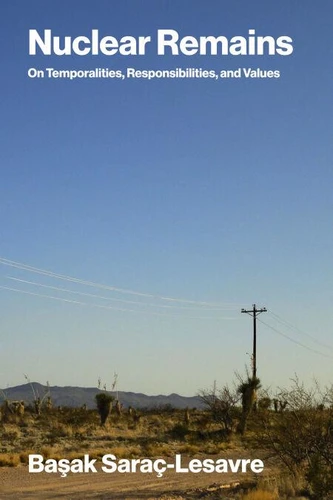Nuclear Remains. On Temporalities, Responsibilities, and Values
Par :Formats :
Actuellement indisponible
Cet article est actuellement indisponible, il ne peut pas être commandé sur notre site pour le moment. Nous vous invitons à vous inscrire à l'alerte disponibilité, vous recevrez un e-mail dès que cet ouvrage sera à nouveau disponible.
Disponible dans votre compte client Decitre ou Furet du Nord dès validation de votre commande. Le format ePub protégé est :
- Compatible avec une lecture sur My Vivlio (smartphone, tablette, ordinateur)
- Compatible avec une lecture sur liseuses Vivlio
- Pour les liseuses autres que Vivlio, vous devez utiliser le logiciel Adobe Digital Edition. Non compatible avec la lecture sur les liseuses Kindle, Remarkable et Sony
- Non compatible avec un achat hors France métropolitaine
 , qui est-ce ?
, qui est-ce ?Notre partenaire de plateforme de lecture numérique où vous retrouverez l'ensemble de vos ebooks gratuitement
Pour en savoir plus sur nos ebooks, consultez notre aide en ligne ici
- Nombre de pages224
- FormatePub
- ISBN978-0-262-05287-0
- EAN9780262052870
- Date de parution19/05/2026
- Protection num.Adobe DRM
- Infos supplémentairesepub
- ÉditeurThe MIT Press
Résumé
An ethnography of U. S. nuclear waste policy, and how to understand contemporary societies' attempts to establish "good" relations with the future. Contemporary societies are often criticized for their incapacity to account for the long-term. Nuclear Remains asks what happens when a society decides to think long-term-examining the U. S. efforts to hold present and distant futures together. Focusing on the case of the U.
S. nuclear waste program, Basak Saraç-Lesavre argues that no temporal orientation is inherently ethical; what matters is how temporal orientations construed as desirable get translated into action. To analyze how concerned actors seek to establish "good" relations between past, present, and future, Saraç-Lesavre introduces the problem of rendez-vous framework-tracing how temporal gaps are identified and resolutions formulated and inscribed in different forms of arrangements.
Her multi-sited ethnographic research takes readers from Congressional debates over funding-to reconcile accountability to and immunity from politics-to Carlsbad, New Mexico, where local actors have been trying to keep their community attached to nuclear futures. Over time, these arrangements face tests. They are barely ever considered au rendez-vous when meeting contemporary conditions, yet produce significant effects: material, economic, political, and moral relations, and ultimately, societies themselves.
This framework applies broadly to cases where temporal relations are at stake: climate change adaptation, government of commons, pension schemes, energy transition, and care systems.
S. nuclear waste program, Basak Saraç-Lesavre argues that no temporal orientation is inherently ethical; what matters is how temporal orientations construed as desirable get translated into action. To analyze how concerned actors seek to establish "good" relations between past, present, and future, Saraç-Lesavre introduces the problem of rendez-vous framework-tracing how temporal gaps are identified and resolutions formulated and inscribed in different forms of arrangements.
Her multi-sited ethnographic research takes readers from Congressional debates over funding-to reconcile accountability to and immunity from politics-to Carlsbad, New Mexico, where local actors have been trying to keep their community attached to nuclear futures. Over time, these arrangements face tests. They are barely ever considered au rendez-vous when meeting contemporary conditions, yet produce significant effects: material, economic, political, and moral relations, and ultimately, societies themselves.
This framework applies broadly to cases where temporal relations are at stake: climate change adaptation, government of commons, pension schemes, energy transition, and care systems.
An ethnography of U. S. nuclear waste policy, and how to understand contemporary societies' attempts to establish "good" relations with the future. Contemporary societies are often criticized for their incapacity to account for the long-term. Nuclear Remains asks what happens when a society decides to think long-term-examining the U. S. efforts to hold present and distant futures together. Focusing on the case of the U.
S. nuclear waste program, Basak Saraç-Lesavre argues that no temporal orientation is inherently ethical; what matters is how temporal orientations construed as desirable get translated into action. To analyze how concerned actors seek to establish "good" relations between past, present, and future, Saraç-Lesavre introduces the problem of rendez-vous framework-tracing how temporal gaps are identified and resolutions formulated and inscribed in different forms of arrangements.
Her multi-sited ethnographic research takes readers from Congressional debates over funding-to reconcile accountability to and immunity from politics-to Carlsbad, New Mexico, where local actors have been trying to keep their community attached to nuclear futures. Over time, these arrangements face tests. They are barely ever considered au rendez-vous when meeting contemporary conditions, yet produce significant effects: material, economic, political, and moral relations, and ultimately, societies themselves.
This framework applies broadly to cases where temporal relations are at stake: climate change adaptation, government of commons, pension schemes, energy transition, and care systems.
S. nuclear waste program, Basak Saraç-Lesavre argues that no temporal orientation is inherently ethical; what matters is how temporal orientations construed as desirable get translated into action. To analyze how concerned actors seek to establish "good" relations between past, present, and future, Saraç-Lesavre introduces the problem of rendez-vous framework-tracing how temporal gaps are identified and resolutions formulated and inscribed in different forms of arrangements.
Her multi-sited ethnographic research takes readers from Congressional debates over funding-to reconcile accountability to and immunity from politics-to Carlsbad, New Mexico, where local actors have been trying to keep their community attached to nuclear futures. Over time, these arrangements face tests. They are barely ever considered au rendez-vous when meeting contemporary conditions, yet produce significant effects: material, economic, political, and moral relations, and ultimately, societies themselves.
This framework applies broadly to cases where temporal relations are at stake: climate change adaptation, government of commons, pension schemes, energy transition, and care systems.



